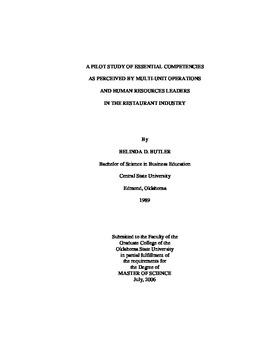| dc.contributor.advisor | Palakurthi, Radesh | |
| dc.contributor.author | Butler, Belinda Delia | |
| dc.date.accessioned | 2014-04-15T22:31:36Z | |
| dc.date.available | 2014-04-15T22:31:36Z | |
| dc.date.issued | 2006-07-01 | |
| dc.identifier.uri | https://hdl.handle.net/11244/9547 | |
| dc.description.abstract | The overall objective of this pilot study was to determine if a universal set of generic competencies, which are considered "soft skill" in nature, could be identified among multi-unit restaurant operations and human resources leaders in the quick service, fast casual, casual dining and fine dining segments; thus providing a guide for restaurant leaders to use when hiring new managers into their organizations as well as giving credence to the idea of hiring managers with diverse dining segment experience. First, the objective of this study was met in that operations and human resources leaders from the quick service, fast casual, casual and fine dining segments were able to identify and agree upon a generic set of competencies they deemed important for individuals to possess in the restaurant industry. The main competency rankings from both the human resources and operations leaders showed that the "core values and ethics" competency was considered the most important with a weighted average of 2.25, followed by "leadership" which had a weighted average of 3.25 and "work ethic" which had a weighted average of 4.12. When comparing the weighted averages in rank order between the operations and human resources leaders, a direct correlation of .98 was found, thus proving there was no disagreement between these two groups. Ten of the thirteen studies referenced in the literature review also identified these same top five competencies as essential, thus giving credence to the generic competency movement. The final statistical test run on this data was a sample t-test of unequal variance to determine if there was a significant difference between the mean weighted average rank for each of the 51 sub competencies among the human resources and operations leaders. Two competencies were found to be significant "establishing direction" t(5)=2.57; p=0.003 and "identify and analyze strengths and weaknesses" t(5)=2.57; p=0.049. | |
| dc.format | application/pdf | |
| dc.language | en_US | |
| dc.publisher | Oklahoma State University | |
| dc.rights | Copyright is held by the author who has granted the Oklahoma State University Library the non-exclusive right to share this material in its institutional repository. Contact Digital Library Services at lib-dls@okstate.edu or 405-744-9161 for the permission policy on the use, reproduction or distribution of this material. | |
| dc.title | Pilot Study of Essential Competencies as Perceived by Multi-Unit Operations and Human Resources Leaders in the Restaurant Industry | |
| dc.type | text | |
| dc.contributor.committeeMember | Moreo, Patrick | |
| dc.contributor.committeeMember | Leong, Jerrold | |
| osu.filename | Butler_okstate_0664M_1978.pdf | |
| osu.college | Agricultural Sciences and Natural Resources | |
| osu.accesstype | Open Access | |
| dc.description.department | Environmental Sciences Program | |
| dc.type.genre | Thesis | |
| dc.subject.keywords | hospitality | |
| dc.subject.keywords | human resources | |
| dc.subject.keywords | competencies | |
| dc.subject.keywords | restaurants | |
